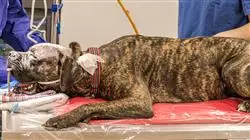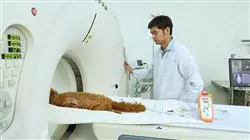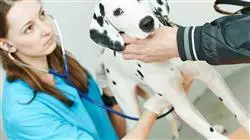University certificate
The world's largest faculty of veterinary medicine”
Description
Acquire the skills of an expert in the area of cardiorespiratory emergencies, with the most up-to-date knowledge and the latest advances in intervention with this high-intensity postgraduate diploma"

In emergency medicine there is a series of understandings, procedures and techniques which are common in the majority of cases, independent of the specialty or specialties involved in each case.
We will show you how to approach patients who arrive at the center with acute problems such as pneumonia or pulmonary thromboembolism, or with aggravated or complicated secondary chronic problems, such as feline patients with asthma or dogs with heart failure and respiratory complications.
Another of the aspects which we address in this training’s degree is caring for patients with cardiovascular disease from their arrival at the emergency center, their initial stabilization, anamnesis and examination to the complementary tests and subsequent medical treatment.
In short, we offer you a complete tour of all the areas of knowledge you need to provide quality emergency car.
The topics and clinical cases proposed, as well as their resolution, are based on the practical experience of the teachers and on the cases most frequently seen in emergency veterinary services.
All information is presented through high-quality multimedia content, analysis of clinical cases prepared by teachers, master classes and video techniques that allow the exchange of knowledge and experience, maintain and update the skill level of its members, create protocols for action and disseminate the most important developments in the emergencies within medicine of small animals.
The latest advances and approach techniques in the small animal veterinary emergency service in a specific and complete training"
This postgraduate diploma in Management of Cardiorespiratory Emergencies Emergencies in Small Animals offers you the characteristics of a course of high scientific, teaching and technological level. These are some of its most notable features:
- Latest technology in online teaching software
- Highly visual teaching system, supported by graphic and schematic contents that are easy to assimilate and understand
- Practical cases presented by practising experts
- State-of-the-art interactive video systems
- Teaching supported by telepractice
- Continuous updating and recycling systems
- Self-regulating learning: full compatibility with other occupations
- Practical exercises for self-evaluation and learning verification
- Support groups and educational synergies: questions to the expert, debate and knowledge forums
- Communication with the teacher and individual reflection work
- Content that is accessible from any fixed or portable device with an Internet connection
- Supplementary documentation databases are permanently available, even after the course
The knowledge necessary to act with the necessary speed in the care of patients with Cardiorespiratory Emergencies compromise"
Our teaching staff is made up of professionals from different fields related to this specialty. In this way, we ensure that we provide you with the training update we are aiming for. A multidisciplinary team of professionals trained and experienced in different environments, who will cover the theoretical knowledge in an efficient way, but, above all, will put the practical knowledge derived from their own experience at the service of the course: one of the differential qualities of this course.
This mastery of the subject is complemented by the effectiveness of the methodological design of this Expert. Developed by a multidisciplinary team of e-learning experts, it integrates the latest advances in educational technology. This way, you will be able to study with a range of comfortable and versatile multimedia tools that will give you the operability you need in your training.
The design of this program is based on Problem-Based Learning: an approach that conceives learning as a highly practical process. To achieve this remotely, we will use telepractice: with the help of an innovative interactive video system, and learning from an expert, you will be able to acquire the knowledge as if you were actually dealing with the scenario you are learning about. A concept that will allow you to integrate and fix learning in a more realistic and permanent way.
This postgraduate diploma in Management of Cardiorespiratory Emergencies Emergencies in Small Animals is based on the use of a highly efficient methodology that reduces the time required"

Our innovative telepractice concept will give you the opportunity to learn through an immersive experience, which will provide you with a faster integration and a much more realistic view of the contents: “learning from an expert"
Objectives
This postgraduate diploma in Management of Cardiorespiratory Emergencies Emergencies in Small Animals compiles the most current knowledge based on the latest scientific research. Our ultimate goal is that the veterinary professional can deal with practically all the emergencies that arise, both in a center dedicated exclusively to emergency medicine and in a generalist center where this service is available.
Our objective is simple: provide you will the knowledge and skills needed to increase your competency in emergency veterinary care"

General Objectives
- Acquire knowledge and fundamental skills related to the initial attention of the patient and the necessary diagnostic and therapeutic procedures in the most common emergency situations
- Identify the main emergency situations related to respiratory pathology
- Establish the fundamental knowledge and skills needed to care for a patient with respiratory problems with the aim of improving the specific skills needed in this professional field
- Demonstrate the action procedures in emergency respiratory situations, with command of the treatment procedures
- Establish the knowledge and skills that the veterinary professional needs to care for a patient with cardiovascular problems, with the aim of improving the specific skills needed in this professional field
Specific Objectives
Module 1.
- Perform the correct triage of patients who arrive at the emergency department
- Assess, manage and provide primary care to patients in the emergency department
Module 2.
- Identify the main emergency situations in clinical practice that are related to respiratory pathology
- Perform correct anamnesis and physical examination to make an accurate diagnosis. Perform stabilization techniques in patients with respiratory problems (thoracic drainage, intubation etc)
- Interpret the most commonly used diagnostic imaging tests in respiratory emergencies
- Administer drugs to patients with respiratory problems
- Perform cardiopulmonary resuscitation procedures based on consensus and latest scientific evidence
Module 3.
- Perform and interpret routine complementary tests in a patient with cardiovascular problems. These could include ECG, blood pressure measurement using different types of non-invasive measuring devices, oxygen saturation measurement, etc
- Perform a diagnosis based on the data from the physical examination and laboratory tests, ECG and the diagnostic imaging tests
- Administer drugs to patients with cardiovascular problems
- Perform stabilization techniques in patients with cardiovascular problems (CPR, cardioversion, etc)

A path to achieve training and professional growth that will propel you towards a greater level of competitiveness in the employment market"
Postgraduate Diploma in Management of Cardiorespiratory Emergencies in Small Animals.
The Postgraduate Diploma in Management of Cardiorespiratory Emergencies in Small Animals is designed to enable the veterinarian to act efficiently and effectively in an emergency in the veterinary office or clinic. This program provides knowledge and skills that allow a correct diagnosis and management of cardiorespiratory problems in small animals. The training covers from the fundamental concepts to the most advanced techniques in the treatment of these pathologies, including the performance of electrocardiograms and echocardiograms, interpretation of blood gases and patient monitoring. In addition, the program delves into the different emergency situations, such as cardiorespiratory arrest, respiratory failure and pulmonary edema, among others.
Specialize in veterinary emergencies
With this Postgraduate Diploma, the veterinarian will have the opportunity to specialize in the management of cardiorespiratory emergencies in small animals, which will allow them to offer a higher quality and more efficient service to their patients. In addition, the program has a first class teaching team, experts in the field and with extensive experience in the veterinary field, which will guide students in their training and professional development. Do not miss the opportunity to expand your knowledge in this important area of veterinary medicine. With the Postgraduate Diploma in Management of Cardiorespiratory Emergencies in Small Animals, you will be prepared to face any emergency and provide quality care to your patients.







